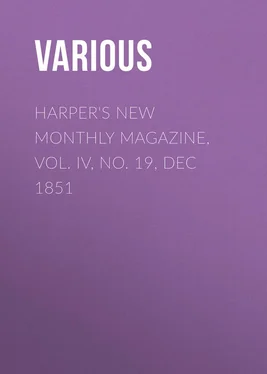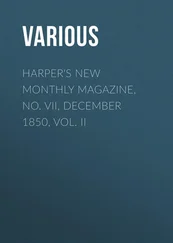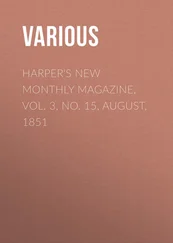Various - Harper's New Monthly Magazine, Vol. IV, No. 19, Dec 1851
Здесь есть возможность читать онлайн «Various - Harper's New Monthly Magazine, Vol. IV, No. 19, Dec 1851» — ознакомительный отрывок электронной книги совершенно бесплатно, а после прочтения отрывка купить полную версию. В некоторых случаях можно слушать аудио, скачать через торрент в формате fb2 и присутствует краткое содержание. Издательство: Иностранный паблик, Жанр: periodic, foreign_edu, на английском языке. Описание произведения, (предисловие) а так же отзывы посетителей доступны на портале библиотеки ЛибКат.
- Название:Harper's New Monthly Magazine, Vol. IV, No. 19, Dec 1851
- Автор:
- Издательство:Иностранный паблик
- Жанр:
- Год:неизвестен
- ISBN:нет данных
- Рейтинг книги:5 / 5. Голосов: 1
-
Избранное:Добавить в избранное
- Отзывы:
-
Ваша оценка:
- 100
- 1
- 2
- 3
- 4
- 5
Harper's New Monthly Magazine, Vol. IV, No. 19, Dec 1851: краткое содержание, описание и аннотация
Предлагаем к чтению аннотацию, описание, краткое содержание или предисловие (зависит от того, что написал сам автор книги «Harper's New Monthly Magazine, Vol. IV, No. 19, Dec 1851»). Если вы не нашли необходимую информацию о книге — напишите в комментариях, мы постараемся отыскать её.
Harper's New Monthly Magazine, Vol. IV, No. 19, Dec 1851 — читать онлайн ознакомительный отрывок
Ниже представлен текст книги, разбитый по страницам. Система сохранения места последней прочитанной страницы, позволяет с удобством читать онлайн бесплатно книгу «Harper's New Monthly Magazine, Vol. IV, No. 19, Dec 1851», без необходимости каждый раз заново искать на чём Вы остановились. Поставьте закладку, и сможете в любой момент перейти на страницу, на которой закончили чтение.
Интервал:
Закладка:
While the bill for allowing the East India Company to export tea to America on their own account, was under consideration in Parliament, Dr. Franklin, Arthur Lee, and others, apprised the colonists of the movement; and when, a few weeks afterward, several large vessels laden with the plant, were out upon the Atlantic, bound for American ports, the people here were actively preparing to prevent the landing of the cargoes. The Company had appointed consignees in various seaport towns, and these being generally known to the people, were warned to resign their commissions, or hold them at their peril.
In Boston the most active measures were taken to prevent the landing of the tea. The consignees were all friends of government; two of them were Governor Hutchinson's sons, and a third (Richard Clarke, father-in-law of John Singleton Copley, the eminent painter), was his nephew. Their neighbors expostulated with them, but in vain; and as the time for the expected arrival of two or three tea-ships approached, the public mind became feverish. On the first of November several of the leading "Sons of Liberty," as the patriots were called, met at the house of John Hancock, on Beacon-street, facing the Common, to consult upon the public good, touching the expected tea ships. A public meeting was decided upon, and on the morning of the third the following placard was posted in many places within the city:
"TO THE FREEMEN OF THIS AND THE NEIGHBORING TOWNS.
" Gentlemen. – You are desired to meet at the Liberty Tree this day at twelve o'clock at noon, then and there to hear the persons to whom the Tea shipped by the East India Company is consigned, make a public resignation of their offices as consignees, upon oath; and also swear that they will reship any teas that may be consigned to them by the said Company, by the first vessel sailing to London.
O. C. Sec'y.
"Boston, Nov. 3, 1773.
" Show me the man that dare take this down!"
The consignees were summoned at an early hour in the morning, to appear under Liberty Tree (a huge elm, which stood at the present junction of Washington and Essex streets), and resign their commissions. They treated the summons with contempt, and refused to comply. At the appointed hour the town-crier proclaimed the meeting, and the church-bells of the city also gave the annunciation. Timid men remained at home, but about five hundred people assembled near the tree, from the top of which floated the New England flag. No definite action was taken, and at three o'clock the meeting had dispersed.
On the 5th, another meeting was held, over which John Hancock presided. Several short but vehement speeches were made, in which were uttered many seditious sentiments; eight resistance resolutions adopted by the Philadelphians were agreed too; and a committee was appointed to wait upon the consignees, who, it was known, were then at Clarke's store, on King-street, and request them to resign. Again those gentlemen refused compliance, and when the committee reported to the meeting, it was voted that the answer of the consignees was "unsatisfactory and highly affrontive." This meeting also adjourned without deciding upon any definite course for future action.
The excitement in Boston now hourly increased. Grave citizens congregated at the corners of the streets to interchange sentiments, and all seemed to have a presentiment that the sanguinary scenes of the 5th of March, 1770, when blood flowed in the streets of Boston, were about to be reproduced.
The troops introduced by Bernard had been removed from the city, and there was no legal power but that of the civil authorities, to suppress disorder. On the 12th, the captain-general of the province issued an order for the Governor's Guards, of which John Hancock was colonel, to stand in readiness to assist the civil magistrate in preserving order. This corps, being strongly imbued with the sentiments of their commander, utterly disregarded the requisition. Business was, in a measure, suspended, and general uneasiness prevailed.
On the 18th, another meeting was held in Faneuil Hall, and a committee was again appointed to wait upon the consignees and request them to resign. Again they refused, and that evening the house of Richard Clarke, on School-street, was surrounded by an unruly crowd. A pistol was fired from the house, but without serious effect other than exciting the mob to deeds of violence; the windows were demolished, and the family menaced with personal injury. Better counsels than those of anger soon prevailed, and at midnight the town was quiet. The meeting, in the mean while, had received the report of the committee in silence, and adjourned without uttering a word. This silence was ominous of evil to the friends of government. The consignees were alarmed, for it was evident that the people were determined to talk only, no more, but henceforth to act . The governor, also, properly interpreted their silence as a calm before a storm, and he called his council together at the Province House, to consult upon measures for preserving the peace of the city. During their session the frightened consignees presented a petition to the council, asking leave to resign their commissions into the hands of the governor and his advisers, and praying them to adopt measures for the safe landing of the teas. The council, equally fearful of the popular vengeance, refused the prayer of their petition, and the consignees withdrew, for safety, to Castle William, a strong fortress at the entrance of the harbor, then garrisoned by a portion of the troops who had been encamped on Boston Common. The flight of the consignees allayed the excitement for a few days.
On Sunday evening, the 28th of November, the Dartmouth , Captain Hall, one of the East India Company's ships, arrived in the harbor. The next morning the following handbill was posted in every part of the city:
" Friends! Brethren! Countrymen! – That worst of plagues, the detested Tea shipped for this port, by the East India Company, is now arrived in the harbor. The hour of destruction, or manly opposition to the machinations of tyranny, stares you in the face; every friend to his country, to himself, and to posterity, is now called upon to meet at Faneuil Hall , at nine o'clock This Day (at which time the bells will ring), to make united and successful resistance to this last, worst, and most destructive measure of administration.
"Boston, Nov. 29th, 1773."
A large concourse assembled in and around Faneuil Hall at the appointed hour, too large to be admitted within its walls, and they adjourned to the Old South Meeting House, on the corner of the present Washington and Milk streets. Hancock, the Adamses, Warren, Quincy, and other popular leaders and influential citizens were there. Firmness marked all the proceedings, and within that sanctuary of religion they made resolves of gravest import. It was agreed that no tea should be landed within the precincts of Boston; that no duty should be paid; and that it should be sent back in the same bottom. They also voted that Mr. Roch, the owner of the Dartmouth , "be directed not to enter the tea at his peril; and that Captain Hall be informed, and at his peril, not to suffer any of the tea to be landed." They ordered the ship to be moored at Griffin's wharf, near the present Liverpool dock, and appointed a guard of twenty-five men to watch her.
When the meeting was about to adjourn, a letter was received from the consignees, offering to store the tea until they could write to England and obtain instructions from the owners. The people had resolved that not a chest should be landed, and the offer was at once rejected. The sheriff, who was present, then stepped upon the back of a pew, and read a proclamation by the governor, ordering the assembly to disperse. It was received with hisses. Another resolution was then adopted, ordering two other tea vessels, then hourly expected, to be moored at Griffin's wharf; and, after solemnly pledging themselves to carry their several resolutions into effect at all hazards, and thanking the people in attendance from the neighboring towns for their sympathy, they adjourned.
Читать дальшеИнтервал:
Закладка:
Похожие книги на «Harper's New Monthly Magazine, Vol. IV, No. 19, Dec 1851»
Представляем Вашему вниманию похожие книги на «Harper's New Monthly Magazine, Vol. IV, No. 19, Dec 1851» списком для выбора. Мы отобрали схожую по названию и смыслу литературу в надежде предоставить читателям больше вариантов отыскать новые, интересные, ещё непрочитанные произведения.
Обсуждение, отзывы о книге «Harper's New Monthly Magazine, Vol. IV, No. 19, Dec 1851» и просто собственные мнения читателей. Оставьте ваши комментарии, напишите, что Вы думаете о произведении, его смысле или главных героях. Укажите что конкретно понравилось, а что нет, и почему Вы так считаете.












